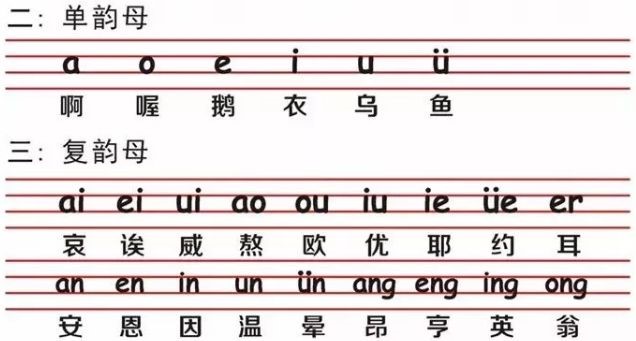Chinese spelling alphabet – phonetic vowel table(yun mu)
Chinese Pinyin alphabet, vowel (yùn mǔ). It is a Chinese phonological term, which refers to the parts other than the initials and tones of Chinese characters. The old name is rhyme. Vowels are composed of three parts: beginning (preposition), abdomen (main vowel) and ending; According to finals, they can be divided into single syllable, compound vowel and simple final vowel.

Chinese phonetic vowel table: a, o, e, i, u, ü, ai, ei, ui, ao, ou, iu, ie, ü e, er, an, en, in, un, ü n, ang, eng, ing, ong.
Classification of Chinese phonetic vowels (based on the textbook of Chinese phonetic alphabet in Chinese in primary school):
- Simple Final Vowels: a, o, e, i, u, u;
- Compound Vowels: ai, ei, ui, ao, ou, iu, ie, ü e;
- Special Vowel: er;
- Nasal Vowels: an, en, in, un, ü n, ang, eng, ing, ong;
- Anterior Nasal Vowels: an, en, in, un, ü n;
- Back Nasal Vowels: ang, eng, ing, ong.
There are 24 finals in the Chinese language of primary school, including 6 simple final rhymes, 8 Multiple finals, 1 special vowels, 9 nasal vowels (5 nose nose vowels, 4 rear nasal vowels).
Usage of finals in Chinese Pinyin and Analogy with English pronunciation rules
simple final vowels:
a (Like "a" in “father” (American pronunciation)
- 阿 ā 姨 yí (aunt)
- 爸 bà 爸 bɑ (father)
o (Like “wo" Lips do not close as the sound isrnade; instead they open further)
- 我 wǒ (me, I)
- 佛 fó (Buddha)
e (Like “uh” in English, similar to the“u”inunder.)
- 饿 è (hungry)
- 快 kuài 乐 lè (happy)
i (Usually pronounced as "ee" as in“he" but after c/s/z and ch/sh/zh/r it is pronounced.)
- 你 nǐ (you)
- 米 mǐ 饭 fàn (rice)
u (Usually pronounced as in "you”)
- 不 bù (no)
- 书 shū (book)
ü (First, try to pronounce "i", and then your tongue stays here, gradually purse your lips.)
- 绿 lǜ 色 sè (green)
- 巨 jù 大 dà (huge)
compound final vowels:
ai (as "igh" in "high")
- 可 kě 爱 ài (cute)
- 白 bái (white)
ei (like a long "a" or the "ei" in "eight")
- 累 lèi (tired)
- 黑 hēi (black)
ui (like "way")
- 回 huí (back)
- 灰 huī 色 sè (grey)
ao (as in "how" or "out")
- 好 hǎo (good)
- 猫 māo (cat)
ou (like the "ow" in "low" or "boat")
- 狗 ɡǒu (dog)
- 口 kǒu (mouth)
iu (like "yo")
- 袖 xiù 子 zi (sleeve)
ie (like ye in "yes")
- 节 jié 日 rì (holiday)
- 谢 xiè 谢 xiè (thanks)
üe (as in“wet")
- 学 xué 习 xí (learn)
- 学 xué 生 shēng (student)
er (similar to "er" in American English, but the mouth opened a little more.)
- 而 ér (however)
- 饵 ěr 料 liào (bait)
an (like an in "bank")
- 安 ān 全 quán (safe)
- 但 dàn 是 shì (but)
en (Like“un”in “under”, but with the vowel alittle higher and further forward.)
- 人 rén (person)
- 恨 hèn (hate)
in (about halfway between“as in green-eenand“-in”as in“pin" .)
- 金 jīn 子 zi (gold)
- 因 yīn 为 wèi (because)
un (ü+n)
- 结 jié 婚 hūn (marry)
- 村 cūn 庄 zhuāng (village)
ün
- 云 yún 朵 duǒ (cloud)
- 运 yùn 动 dòng (sport)
ang (like“a”(as in “father”) +"-ng")
- 帮 bāng (help)
- 黄 huáng 色 sè (yellow)
eng (Like“-ung" as in “hung")
- 冷 lěng (cold)
- 疼 téng (aches)
ing (Like English “ing", but the first sound a littlehigher and longer)
- 赢 yíng (win)
- 安 ān 静 jìng (quiet)
ong
- 自 zì 从 cóng (since)
- 冬 dōng 天 tiān (winter)